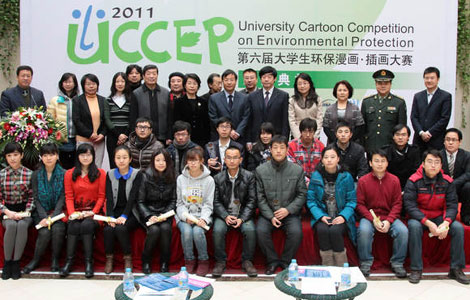Auto rules will not affect foreign businesses
Updated: 2012-01-03 14:00
(Xinhua)
|
|||||||||
BEIJING - China's recent move to take finished automobiles off of a list of industries where foreign investment is encouraged will not affect the operations of existing Sino-foreign joint ventures in China's auto sector, an official with the country's top economic planner said.
The National Development and Reform Commission (NDRC) and the Ministry of Commerce jointly issued a new guideline for foreign investment last week, moving "finished car manufacturing" from the "encouraged" list to the "approved" list.
An NDRC official explained that the move was the result of excesses in both production capacity and finished automobile companies in China.
"It was a normal adjustment in light of the development of China's auto industry," said the official with the NDRC's department in charge of foreign investment, who declined to be named.
"There is no such issue of tightening up, nor will it affect the operations of existing joint ventures in China," the official said.
China has been the world's largest auto producer and market by volume since 2009. Its auto sales reached 18.06 million units in 2010, while output rose to 18.26 million units.
The country has more than 130 finished automobile producers, more than any other in the world, but the companies are scattered and not strong enough as mergers and acquisitions have been slow.
Lured by market booms in previous years, many Chinese firms made ambitious plans to expand production capacity. But they may have run into a cooling-off period this year caused by the expiration of car purchase incentives and worsened by the government's macro tightening measures.
China's auto sales rose just 2.56 percent year-on-year to 16.82 million units in the first 11 months of 2011, a dramatic drop from 34 percent in 2010 and 42 percent in 2009, according to the China Association of Automobile Manufacturers (CAAM).
The government has been controlling the approval of new finished auto projects more rigorously in the past two years in order to curb overcapacity, the official noted.
"However, that does not mean we are tightening policies over foreign investment in the auto industry," he said. "Instead, we aim to guide foreign investment into projects with better market prospects and higher returns."
China is the biggest market for major global auto companies such as Volkswagen and General Motors. About 70 percent of domestically-made sedans are produced by Sino-foreign joint ventures in China, which also dominates the most profitable middle- and high-end markets.
China continues to welcome foreign investment in its auto sector and encourages transnational auto firms to set up research and development centers in China and invest in key technologies, auto parts and components, the NDRC official said.
The government's new guideline encourages foreign investment in areas such as the manufacturing of gasoline auto engines with power per liter at 70 kilowatts or above, as well as key auto components and parts for alternative-fuel cars.
The new guideline made the country more open to foreign investment by adding encouraged items, reducing limited and prohibited items, and lifting caps on the proportion of foreign capital in some sectors, the NDRC official noted.
In the first 11 months of this year, China attracted $103.77 billion in foreign direct investment, up 13.15 percent from the previous year.
Compared with previous guidelines, more foreign investment is encouraged in energy-saving and environmentally-friendly technologies, new-generation information technology, biotechnology, high-end equipment manufacturing, alternative energy and advanced materials.
The guideline will take effect January 30, 2012.
Related Stories
16th International Auto Expo to unveil in August 2011-07-28 10:42
Automakers benefit as domestic sales soar 2010-12-03 08:04
Emergence of lesser-known brands 2011-03-23 10:49
Germany celebrates 125 years of the auto 2011-08-30 08:15
Motor vehicles in China hit 217m 2011-07-20 10:23
- CPI to ease, inflationary pressure remains
- New orders of Chinese shipbuilders sink
- Land sales in Chinese cities fall 13%
- Rail e-ticket sales get off-track
- Auto rules will not affect foreign biz
- Economy to remain beacon and engine
- Beijing home sales plummet in 2011
- Sino-Russia power project completes









